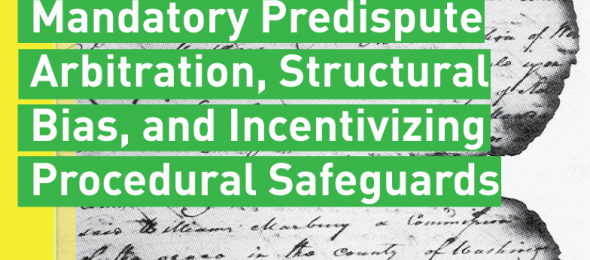Pennsylvania State University’s William Trickett Faculty Scholar and Professor of Law Nancy Welsh has published a thoughtful paper entitled Mandatory Predispute Consumer Arbitration, Structural Bias, and Incentivizing Procedural Safeguards, 42 Southwestern University Law Review 187, 2012; Penn State Legal Series Research Paper No. 1-2013. In her paper, Professor Welsh discusses the increasing use of mandatory consumer arbitration clauses that include class waivers.
Here is the abstract:
Within the past several decades, there has been an explosion in the creation, institutionalization and use of “alternative” dispute resolution procedures. Mandatory predispute arbitration has generated the most controversy because it appears beset with structural bias. The recent cases of AT&T Mobility LLC v. Concepcion and Compucredit Corp. v. Greenwood have raised additional concerns as the Supreme Court has announced that corporations can force consumers to arbitrate their private and statutory claims and give up their rights to pursue class relief. This Article begins by arguing that the Supreme Court’s enthusiastic embrace of mandatory predispute arbitration should be understood primarily as institutional self-help, as an opportunistic search for the funding and personnel that courts need to conduct fact-finding and decision-making in cases that the courts perceive as routine. By permitting corporations to impose class waivers on consumers, the Supreme Court is incentivizing the corporations to provide and fund a national private small claims court.
If the Court is incentivizing in this way, however, this Article urges that it should demand more in return for class waiver. Specifically, it should demand evidence that the arbitration procedure is sufficiently attractive to consumers so that they will pursue their claims, as well as evidence that the procedure is sufficiently fair. One difficulty in making these demands, however, is that courts are obligated to use very limited grounds and a deferential standard of review for arbitral awards.
Second, therefore, this Article urges courts to mine past experience in other legal contexts that involve privatized judicial functions, a deferential standard of judicial review, and the incentivizing of procedural safeguards. For guidance, this Article examines MetLife v. Glenn and the evolution of the deferential standards of review that courts apply to ERISA plan benefit denials by private claims administrators, particularly when such administrators operate in a conflicted decision-making context. In this context, the Supreme Court has managed to acknowledge the existence of structural bias and make it a relevant and important factor to be considered as part of deferential judicial review. Further, the Supreme Court has provided guidance to lower courts regarding the weight to be given to structural bias and has provided examples of the information required to assess such weight. Structural bias has been given the stature of tiebreaker in close cases. Finally and most important for the purposes of this Article, the Supreme Court has also incentivized the provision of structural and procedural safeguards (as well as discovery into the existence and operation of such safeguards) in order to reduce the potency of the structural incentives that encourage biased decision-making. In other words, the Supreme Court has incentivized the provision of safeguards that will enhance the likelihood of accurate decision-making—all while maintaining a deferential standard of review.
Glenn and its progeny thus offer procedural safeguards that the Supreme Court could — and should — import into its arbitration jurisprudence. These, at the very least, are the sorts of safeguards that the valuable bargaining chip of class waiver should be able to buy.
This and other scholarly papers authored by Professor Welsh are available for download (free of charge) from the Social Sciences Research Network.














